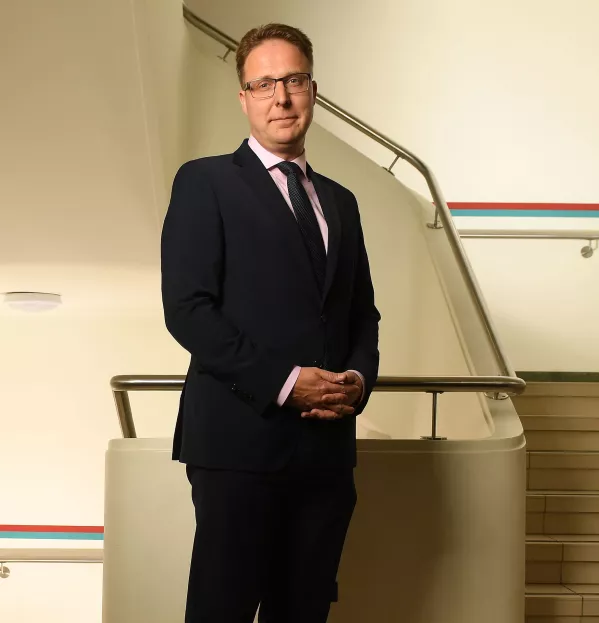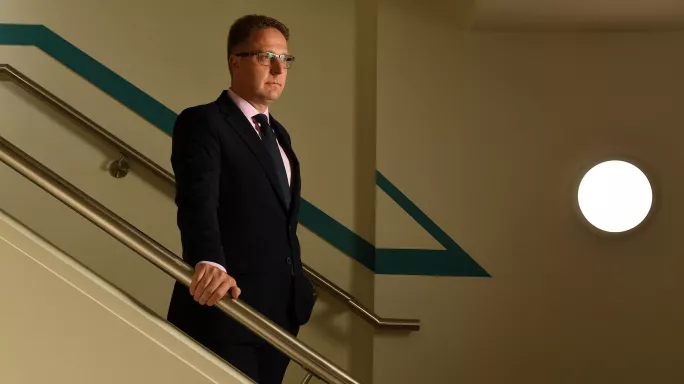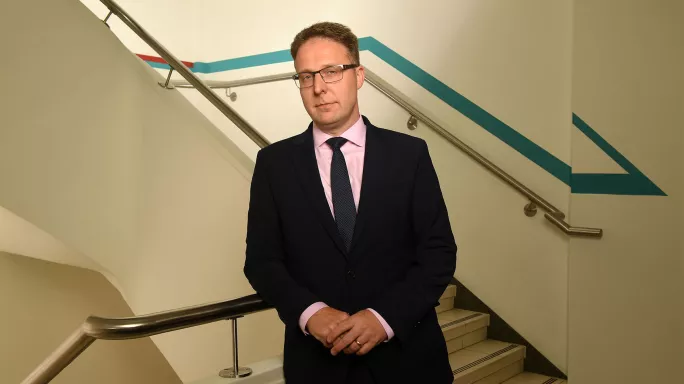Ofsted Academy chief: School inspections will always be ‘high stakes’

In a week where overall effectiveness grades have been scrapped and a new inspection framework promised, Ofsted’s launch of its new inspector training and development arm Ofsted Academy may have been overshadowed.
However, chief inspector Sir Martyn Oliver has been clear that the academy is a “priority” reform, and it will likely be pivotal to how the organisation “resets” its relationship with schools.
The academy will be responsible for how the inspector workforce is trained and developed, and therefore dictate the experience of inspection for teachers and leaders.
That makes the job of Matthew Purves, named as director of the Ofsted Academy, a critical one. It’s a potentially controversial choice: Mr Purves was previously Ofsted’s regional director for the South East, with the Reading school of Ruth Perry one of many under his remit.
The academy he will run has been launched amid a programme of reform sparked by a cross-sector campaign for change that intensified following the death of headteacher Ms Perry, who took her own life following an Ofsted inspection at her school Caversham Academy last year.
- Gilbert review: DfE targets drove down Ofsted inspection quality, review finds
- Report cards: The big questions about Ofsted school inspection changes
- Concerns: Ofsted school inspection changes must go further
In an exclusive interview, Mr Purves addresses Ms Perry’s death directly.
“I want to express my deepest condolences to Ruth Perry’s family. Ruth Perry was precious and her death was a tragedy. No one should feel as she did. We, Ofsted, have to learn and change. Reform has started and we have more to do.”
Priority to ‘reduce pressure on those we inspect’
Bringing the learnings that have occurred since that time to design a new system that ensures HMIs’ deliver on their part of the chief inspector’s pledge to “reduce the pressure on those we inspect”, is his priority with the academy.
There is a lot of work to do in that area.
A coroner investigating Ms Perry’s death highlighted the “almost complete absence of Ofsted training or published policy” to identify signs of school leader distress. And Dame Christine Gilbert, who carried out a learning review into Ofsted’s actions following Ms Perry’s death, identified a reluctance to “address conduct issues” within the inspectorate, with people “getting away with being unpleasant”.
Mr Purves, who is also a former director of education services at Lift Schools (previously known as Academies Enterprise Trust), told Tes that the findings left him “really sad”, adding “that’s not something I would have ever hoped would have happened in the region that I was responsible for”.
In her report, Dame Christine said that the immediate review of Caversham Primary’s inspection was initially dealt with at regional director level, and suggested that it would have been “helpful” for a more national figure at Ofsted to lead the response.
Mr Purves says he now has a “stronger appreciation of the way that inspection needs to do the right thing for children, but support leaders and teachers at the same time”.
However, he also says that “high stakes will always be there to some extent when it comes to Ofsted inspections”, and that “inspection is a human process” and Ofsted’s findings from the Big Listen highlighted the inevitable “power imbalance in that”.

‘Building inspection relationships’ part of training
Respondents from the school sector told Ofsted’s Big Listen that there is a “culture of fear around inspections”, with others reporting that some inspectors exhibit “bullying” behaviour.
Dame Christine also acknowledged this imbalance, recommending that inspector training is “specifically designed to reflect the unique power dynamic of inspection” with tools to “build appropriate relationships during inspection”.
While Ofsted has committed to mental health training for all inspectors and introduced a pause policy in exceptional circumstances, it said it recognises it still has more to do to improve inspector conduct and training.
This week, Ofsted said the new academy will allow the watchdog to “invest in its inspector and non-inspector staff” and bring together “induction, training, learning, professional development and good practice”.
Mr Purves, who has also been revealed this week as the lead for Ofsted’s external reference group focussed on the “wellbeing of leaders and staff”, tells Tes: “In really difficult circumstances, you need to be looking after the people as well”.
A focus on reflection
But how does he believe the Ofsted Academy addresses that imbalance in power between inspector and the inspected?
He says it will need to focus on “reflection” - a word he returns to throughout the interview and is clearly central to his vision for the academy.
Although he adds he has seen reflection take place “in and after school inspections”, he admits there has not been a “routine route for reflection to feed into training and change what Ofsted does”, and that this is an area the inspectorate can “get a lot better at”.
But what will the academy do to deliver these much-needed improvements in practice?
Mr Purves’ tells Tes the academy is an opportunity for Ofsted to draw together everything it does around workforce, from “attraction to induction to training, learning and development”.
Inspectors will attend an online session at the academy every Friday, led by fellow Ofsted inspectors selected for their “excellent practice”, Mr Purves says, and who will also have their workload adjusted accordingly to allow for their teaching commitments.
Training ‘no substitute for experience’
Another function of the academy will be attracting new inspectors from a “diverse range of backgrounds and experiences into Ofsted”, according to the academy chief.
This more diverse workforce will include individuals with specific phase experiences, from primary to pupil referral units, he says - addressing previous criticisms that some inspections are carried out by HMIs with no experience of the phase they are evaluating.
Although Mr Purves says that no Ofsted inspector goes into a school without appropriate training, he admits there is “no substitute for experience”, even with “powerful training”.
Mr Purves describes his own lack of inspecting experience - spending a decade as a civil servant in the Department for Education before joining Ofsted - as “unusual”.

Does this risk limiting his expertise and knowledge in a role so focussed on the training and learning of inspectors?
Mr Purves argues that his government experience is a “good thing” for the role, adding that “having those civil servant skills of drawing information across a wide range of places and synthesising that is really important, too”.
The academy will have its own governance committee, separate from Ofsted’s board, to help Mr Purves steer its own development. A big priority will be consistency.
Restoring balance to an off-kilter system
In an internal ‘Big Listen’ survey, Ofsted’s inspector workforce complained of “inconsistencies and varying levels of support” in its induction and training processes.
And sector responses to the Big Listen also showed that consistency was lacking in some inspections, with one in six saying inspectors’ knowledge and expertise were poor (16 per cent).
Although Mr Purves is adamant that a lack of consistency is not a “terrible problem” for the watchdog, he admits that it isn’t something that has always been central to their approach to training.
Mr Purves tells Tes the academy will also focus on fixing retention, “creating a roadmap for further development of existing staff to fix the tide of inspectors leaving after two to four years in the job.
“I’ve got no problem with staff spending time in Ofsted and then going back to the sectors we inspect - that’s brilliant - but we’d like to keep them just a little bit longer,” he says.
With both inspectors and the inspected seemingly unhappy with the status quo, the academy could be one of the most consequential reforms to bringing back some balance to an off-kilter inspection system - and the first in the firing line if the sector’s trust in Ofsted is not restored.
For the latest education news and analysis delivered every weekday morning, sign up for the Tes Daily newsletter
You need a Tes subscription to read this article
Subscribe now to read this article and get other subscriber-only content:
- Unlimited access to all Tes magazine content
- Exclusive subscriber-only stories
- Award-winning email newsletters
Already a subscriber? Log in
You need a subscription to read this article
Subscribe now to read this article and get other subscriber-only content, including:
- Unlimited access to all Tes magazine content
- Exclusive subscriber-only stories
- Award-winning email newsletters
topics in this article



